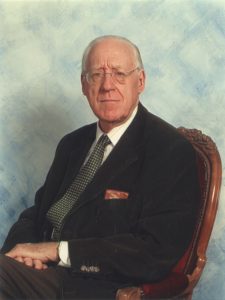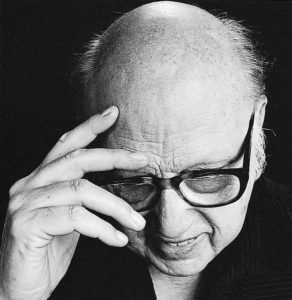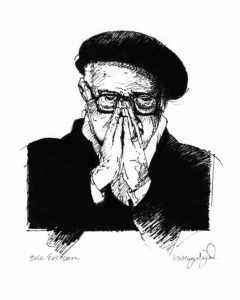Paul Wehrle and Eric Ericson
Choral Trailblazers Who Changed Our Lives
The week of February 11, 2013 was emotionally difficult for the world choral community owing to the loss of IFCM Past-President Paul Wehrle followed by IFCM Honorary President Eric Ericson. We spent much of the week corresponding about the passing of these two gentlemen, not just mourning their loss, but reflecting on the enormous impact that they had on our choral lives, either directly or indirectly. On behalf of the Board of Directors and the membership of IFCM, we share in the sorrow of the families, but we honor our colleagues for the insightful vision that helped to position choral music as a positive world-wide vehicle for peace.
I have asked Prof. Leon Tong, First Vice-President, and IFCM Board Member Mr. Fred Sjöberg to compile material that will help us better understand Paul and Eric as conductors, teachers, and visionaries, and as human beings. Through this, I hope the families will find some comfort in the knowledge that so many people all around the globe are with them in the time of grieving.
Dr. Michael J Anderson, IFCM President
Remembering Paul Wehrle
Leon Shiu-wai Tong, First Vice-President, IFCM
President, Hong Kong Treble Choirs’ Association
Paul Wehrle was the founding Secretary General of Europa Cantat from 1963 to 1976. He followed his dream of bringing people together through choral music, founding the International Federation for Choral Music (IFCM) in 1982 together with other choral masters. He then became the very first president of IFCM. Paul was an encyclopedic person with a gift for careful planning. With his strong vision of choral music as a means for peace, he originated the idea of the World Choral Symposium, in which by cooperating with a national organization, institution or committee in a host country, a platform could be created for the world’s most prestigious choral lovers to meet and share their music from their different parts of the world. Thus choir singers were enriched through the sharing of music; conductors improved their skills; and the world has become a better place. Paul’s idea of enhancing the choral world with his belief in choral peace has made great progress.
Paul was a very tall man and he always called himself the ‘Old Elephant’. To the choral music world he was also a great giant, not so much because of his height, but because of what he had established and what he had brought to the choral music world in his long life. I had the greatest respect for his considerable guidance to the younger generation and especially for his support for the Chinese Choral World. I had also received calls from him from time to time with his advice and encouragement to me about the development of choral music in China. At the age of 80, he was still very involved and very active in supporting choral festivals in Hong Kong and China, and this is greatly appreciated. I also remember that the very last time he participated in a choir festival in Hong Kong and China, although he had cancelled all the touring part of the festival because it was too fatiguing, he still insisted on being present at all the important meetings and concerts to show his support. He was like a leader guiding and caring for us all the time whenever we needed support.
I am sure Paul would not mind if I mention here something about him that was, actually, very endearing. When he felt tired during a concert, Paul would put a piece of veiling over his head before falling asleep. But what I want to say is, even then, he would insist on staying until the end of the concert. I admired his persistent spirit very much.
Here I have also the tributes to Paul from the European Choral Association – Europa Cantat, and from Royce Saltzman and María Guinand, representing lovers of choral music from Europe, America and Latin America .
Remembering Paul Wehrle, founding Secretary General of the European Federation of Young Choirs (which later became Europa Cantat and is now the European Choral Association)
Sonja Greiner, Secretary General, European Choral Association – Europa Cantat
(Also on behalf of the Board Association)
I met Paul for the first time in 1982 at the EUROPA CANTAT Festival in Namur, Belgium. His presence was impressive, not only physically – since he was a tall man and I am rather short – but also because when he stepped into a room it immediately became clear that he had to be somebody important.
During the following years I met him several times at different national and international events in Germany. Paul followed my professional development and it was also thanks to him that I am now one of his successors. Over the years we did not always agree, but we always kept in touch and we both supported our work and believed that singing together can contribute to a peace-building process. Paul’s visions will continue living in our activities and he will not be forgotten!
Royce Saltzman, Past President, IFCM
Paul Wehrle was a tall man…not just in stature, but in ideas. He was someone you looked up to because he was a visionary, a person who had a global perspective of choral music that went beyond national boundaries. Paul believed that singing was a powerful force that could build bridges between people, regardless of differences in cultural background, spoken language, politics, religion, or race. His ‘bridge building’ brought people together through singing, whether in the classroom, a festival setting, or the concert stage. As a result, he was a driving force in the founding of IFCM, serving as its first president from 1982-85. The World Symposium was his idea. Over the years his ‘reflection’ has been mirrored in Vienna, Vancouver, Minneapolis, Kyoto, and Sydney, to name only a few of the great host cities. In like manner, Paul was a major influence in the early days of Europa Cantat (now the European Choral Association) which today represents the whole of the continent.
Paul Wehrle’s life as an educator, musician, leader, and mentor converged to make a powerful statement about who he was. To those of us who knew him well, he will always remain tall…a person we looked up to. Thank you, Paul Wehrle.
María Guinand
Artistic Director, Fundación Schola Cantorum de Venezuela
Advisor, IFCM
Paul Wehrle was a very enthusiastic, idealistic and sincere man. His strong personality, which came through his ringing voice, will always remain in my memory. Every New Year’s day, our phone would ring at 8am and there was Paul wishing us Happy New Year. His love for choral music made him a very special person, deeply devoted and generous in leading many international projects, laying the foundations of the International Federation for Choral Music.
I met Paul back in 1980 during the Choralies at Vaison la Romaine and later at Europa Cantat at Namur, in 1982, when IFCM was created. I admired his capacity for dreaming and being a visionary, but especially I admired his very positive attitude towards new projects and ideas that could help to spread choral projects. As first President of IFCM, Paul promoted together with his colleagues many new ideas and events such as the World and Regional Symposia, but he was also very concerned about finding ways to help the development of choral music in regions with less experience, such as Latin America.
He actively supported our initiative of the America Cantat Festival and the social work of the Andean Project. When he came to Caracas in the year 2000 for America Cantat III, Paul discovered our musical potential in both youth orchestras and choirs, and subsequently he continued to foster many international relationships and projects. We are all grateful for his legacy, which is based on solidarity, compassion, friendship and contagious enthusiasm in promoting the values of choral music. For Alberto and me, it was a privilege to live all these years of achievements close to him.
Many thanks dear Paul!
Paul’s devotion to the development of choral music was unbelievable. He was awarded the Staufer Gold Medal in recognition of his life work in choral music. We, all the choral lovers around the world, will remember Paul as a pioneer with a firm belief in choral music as a means for peace and we shall rejoice in the memories and inspirations he gave us.
Writing this now, I realize that I never mentioned to Paul how greatly his spirit and vision had inspired me. But I do not think it matters as I feel sure he knows that I am telling him now, and I can imagine him looking up with a wistful smile. I wish that God may guide him all the way through.
Remembering Eric Ericson
Fred Sjöberg IFCM Board Member
Christian Ljunggren, Artistic Director at INTEKULTUR, Former IFCM Secretary-General
An era in Swedish and international choral life came to an end on February 16, 2013: the legendary choral conductor Professor Eric Ericson passed away at the age of 94.
The importance of Eric Ericson in modern choral life is almost inestimable. For choral directors from all over the world he symbolized the professional choral conductor and he made choral singing, especially a cappella singing, equal to other forms of art. He formed his Kammarkören in 1945 (in 1988 renamed Eric Ericson’s Chamber Choir) and it became the model for the a cappella chamber choir not only in Sweden but throughout the world. In 1951 he became the leader of the Swedish Radio Choir and the same year was put in charge of choral conducting at Musikhögskolan, The Royal College of Music. ‘Eric’ from then on was the great maestro for all coming generations of Swedish choral conductors. Many of the internationally known Swedish solo singers have been choristers in his choirs, such as Elisabeth Söderström, Erik Saedén, and Nicolai Gedda, and later Anne Sofie von Otter.
In his choral work he collaborated with a new generation of composers in Sweden and abroad. His friendship with composers like Ingvar Lidholm, Sven-Erik Bäck and Lars Edlund resulted in many grand pieces of a cappella choral music. In the 1970s his international influence became greater, especially through the epoch-making recordings Europäische Chormusik. In the field of Baroque music there are numerous recordings with his choirs and the Drottningholm Baroque Orchestra, Stockholm, and Concentus Musicus, Vienna. His recording of Mozart’s The Magic Flute was used in a film directed by Ingmar Bergman which was viewed internationally. His world-wide choir tours also included the famous male choir OD, Orphei Drängar.
Eric Ericson also held numerous courses and workshops. Many people all over the world who joined his educational activities were proud to proclaim themselves a pupil of Eric Ericson. He regularly conducted many top international choirs, including the Netherlands Chamber Choir, the RIAS Kammerchor, the BBC Singers, and Groupe Vocal de France. It is worth mentioning that his musicianship had no borders. His collaborations with jazz musicians such as Duke Ellington, Alice Babs, and Svend Asmussen are legendary. He was a good jazz pianist himself. In 1997 he was awarded the Polar Music Prize together with Bruce Springsteen.
Besides his importance on the élite level, Ericson met with and taught amateur choirs all his life. He had a great interest in the choral art as a lay activity and always emphasized the choral community as an ecological system where the top level should inspire the amateur choirs, and believed that wide-ranging choral singing constituted the pre-condition for the activities of élite choirs. That he was recognized as the patron of all choir singers, professional and amateur, is symbolized by the fact that he was the Honorary President of IFCM, and also the World Choir Games. For him, however, these titles were not only formal. In recent years, he kept himself up-to-date on what was happening in the choral world.
Eric Ericson must have been aware of his importance in the choral art of his times, but he was also a very humble man. This can be exemplified by what happened at the opening ceremony of the IFCM World Symposium in Stockholm in 1990. In the first part of the concert he conducted his Chamber Choir in Lars Edlund’s Gloria and other advanced pieces. In the second part he only appeared once, in OD’s choral piece Lawn tennis where he rushed on stage (as a ball boy in short trousers) responding to the command of the referee to ‘Catch the ball, please!’
María Guinand, Artistic Director
Fundacion Schola Cantorum de Venezuela
Eric Ercison was one of the most important figures on the choral scene during the twentieth century. His innovative choral work was always a landmark for many musicians and conductors and his emphasis on performing the music of his fellow composers and colleagues created widespread interest in the new choral music of Sweden. Through his work, Eric was one of the best cultural ambassadors of his country. We met Eric in 1990 when we participated in the Second World Choral Symposium in Sweden with the Schola Cantorum de Venezuela. We were thrilled to listen to his choir in the opening concert, admiring the perfection and musicianship of his choir, and we also discovered his good sense of humor.
Eric came to Caracas in early January of 1991 to teach conducting, to work with the Schola Cantorum and to share with us the compositions of so many of his countrymen during an unforgettable week of music and friendly contact. Two of the most vivid memories I keep from this visit were his informal ‘open’ rehearsal of Swedish songs for Venezuelan conductors during a delicious dinner at the Swedish Embassy in Caracas (many ‘shots’ of Aquavit between songs) and his child-like delight when swimming in the Caribbean Sea for a whole afternoon in the month of January. He just could not believe it! Over the years, we met Eric on many occasions and always remembered these days.
But perhaps the most moving and personal moments we shared with him were in 2009, when he celebrated his ninetieth birthday, and our Youth Schola (integrated by 50 children from our Music and Social Programme in Venezuela) were invited to Stockholm to be part of the Eric Ercison Day. Our children sang for him in the open courtyard of the Adolf Frederiks Skola on a freezing day, together with the choirs of Bo Johansson, and also took part in the concert in Berwald Hall together with the Radio Choir and the Eric Ericson Chamber Choir. The moment when Eric walked on stage and conducted all the choirs in the emblematic Swedish song Kung Liljekonvale will remain in our memories as the legacy of a man who had a profound love for music and a warm and humble heart. We thank you Eric for being part of our lives.


